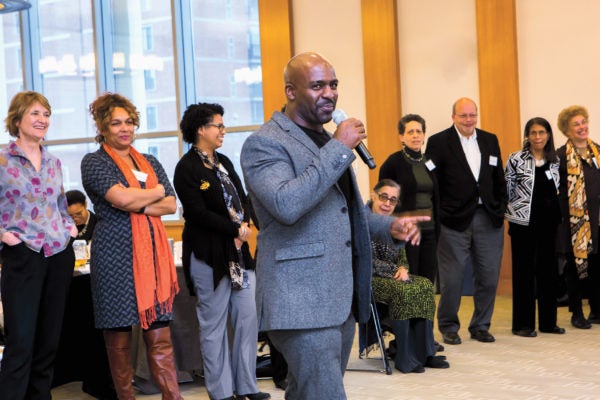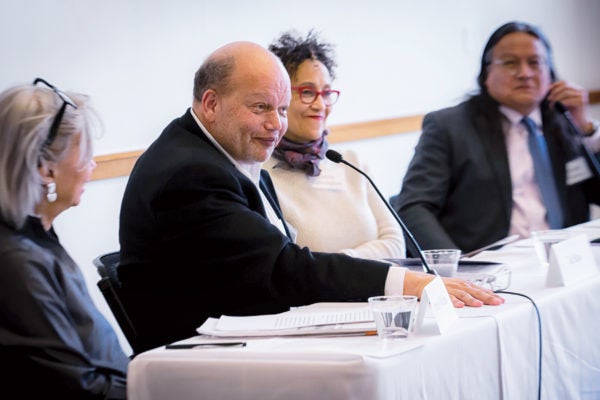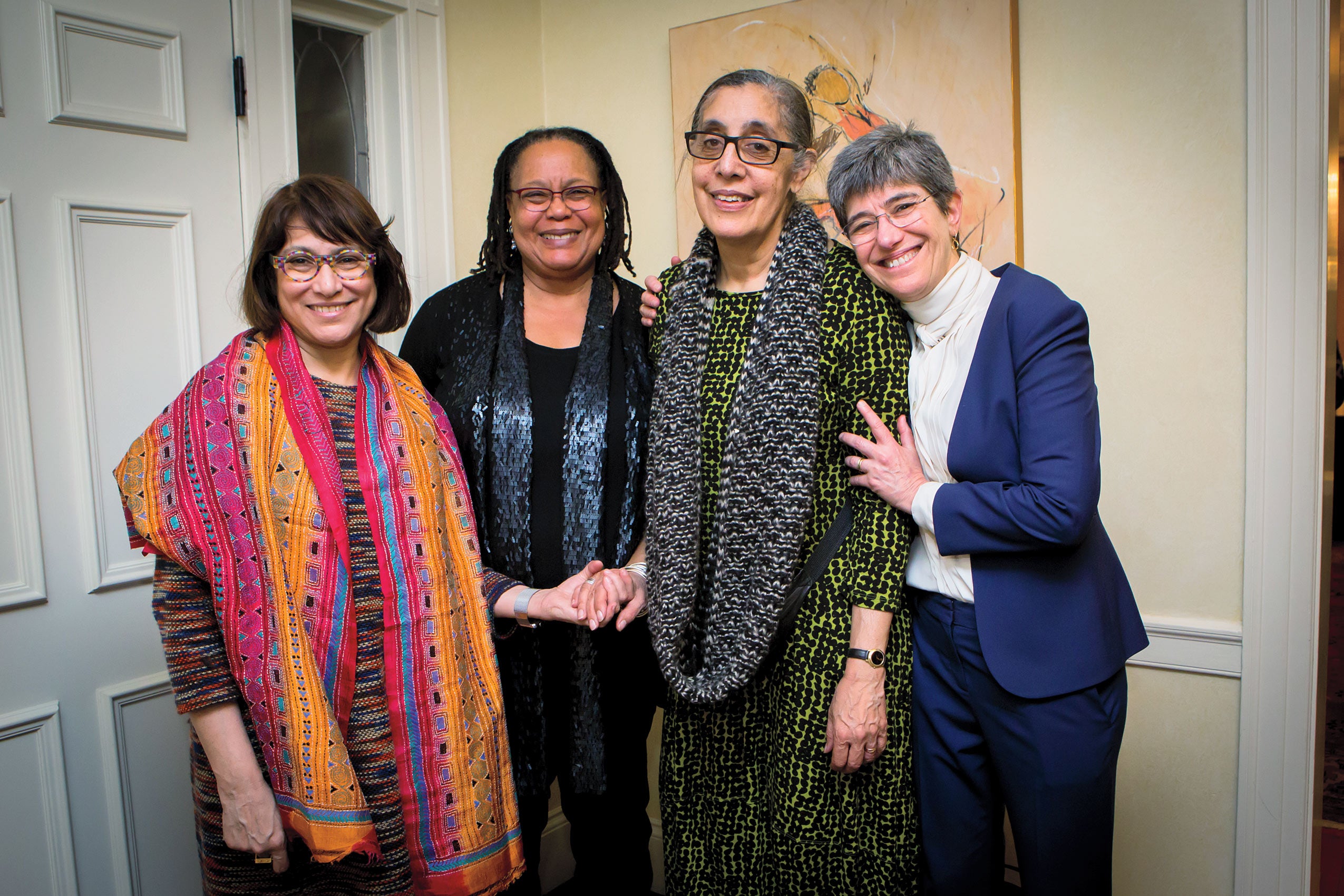At an event at Harvard Law School honoring Lani Guinier earlier this year, Susan Sturm invoked a phrase that was familiar to most of the attendees, a mix of Guinier’s family, colleagues, collaborators, friends and students. It was a line that Guinier often used when prodding her students into pushing harder and thinking deeper: “My problem is, if you stop there … ”
To Sturm, who is a professor of law and social responsibility at Columbia Law School, that phrase is emblematic of Guinier—how she constantly pushed the boundaries of what she and her students could accomplish.
The symposium, “Building Up and Building Out,” honored the work that Guinier has done, including during her tenure at HLS. Renowned for her books such as “Lift Every Voice” and “The Tyranny of the Meritocracy,” Guinier joined the HLS faculty in 1998, following 10 years at the University of Pennsylvania Law School. She became a professor emerita at HLS last year.
“Her work reached for a redesign of our basic institutions and what politics even means, and in the process redefining race and gender identity,” said Sturm, a co-organizer of the event. “That sounds pretty daunting and exhausting, and maybe we have moments of hopelessness. But, Lani, you have taught me to marry struggle with joy, how collaboration and creativity produce astoundingly sustaining relationships. And you’ve shown me the possibility of the human spirit.”
“Be ready to open your mind, and take off your cool.”
Bryonn Bain ’02
There were further words of praise for Guinier, who was present at the event, including from Dean John F. Manning ’85: “She has done nothing short of change the way we think about law,” he said. “She’s made us rethink the fundamental connection between race and the distribution of political power in our system. She’s been a great scholar, a great teacher, and an unfailingly generous colleague.”
But in keeping with the pioneering spirit of Guinier’s work, this was no ordinary afternoon of tributes.

Bryonn Bain ’02, a student of hers who went on to become a prison activist and hip-hop artist, set the tone for the day by delivering a musical number: an unaccompanied rap whose lyrics—about hanging up on the devil on a long-distance call—had a more playful political overtone. He then warned the attendees that they should be ready to take a few creative leaps: “She forced us to bring creativity and collaboration into the space, and so I’m going to ask you to do some things that you’ve never done before. Be ready to open your mind, and take off your cool.”
This launched a series of interactive events between the day’s formal discussions. Each table of attendees was assigned a “scribe,” to record and interpret the day’s events. Bain also circulated a yellow notepad for everyone to write a line or two about their experiences with Guinier or their impressions of her; the collective work became a poem that he recited at the end.
Another colleague, Tim Mitchell, engaged the group in interactive theater exercises. Mitchell, who is now director of fine arts at the Flint Hill School in Virginia, has worked with Guinier to explore the educational possibilities of theater. That day, he challenged the group to personify a food that exemplifies their idea of justice. The food choices were certainly revealing: One picked a mashed potato because it’s malleable, another chose Nutella because it’s spreadable, and another picked corn because it grows in the sun and needs to be cultivated. And perhaps for self-explanatory reasons, another said that justice was more like mystery meat.

One of the more serious moments came during the panel called “Rethinking Zero-Sum Conventions of Power,” which invoked the most painful—and probably most famous—moment in Guinier’s career: In 1993 she was nominated by President Bill Clinton to head the Justice Department’s Civil Rights Division, only to be targeted by an opposition campaign which sometimes quoted her words out of context. This led to Clinton’s oft-criticized decision to withdraw his support, an occurrence that Guinier would refer to as her “dis-appointment.”
Patricia Williams ’75, a professor at Columbia Law School, recalled how disturbing that was: “I remember seeing her on TV; her lips were moving but you never heard her voice. People were speaking over it, talking about how dangerous she was and saying what she was [allegedly] saying—but never saying what she really represented.” Dayna Cunningham, who directs the Community Innovators Lab at MIT, also said she had been disturbed by that incident. But she pointed to a much earlier moment, when Guinier’s fourth-grade teacher reprimanded her for interrupting a history class by pointing out that the Founding Fathers had owned slaves. Thus, she noted, the Clinton incident wasn’t the first time that Guinier had gotten herself in trouble for speaking truth to power.
Another panel, “Transformative Pedagogy,” shed light on Guinier’s creative teaching methods. Former student Jennifer Gachiri ’09 recalled with pride that she’d once put handcuffs on Guinier—the handcuffs were paper, but the issues being discussed were real. The context, she explained, was Guinier teaching the case of a village in India that sued Coca-Cola and won, after Coke’s water extractions in the village produced a toxic sludge that it then sold back as fertilizer. The class re-enacted the human chain that the villagers had made around the factory, and the lesson that corruption could be toppled stuck with Gachiri. “That really inspired me as a black woman and a public interest lawyer,” she said.
The day’s final tribute came from Guinier’s son, Nikolas Bowie ’14, who was recently appointed an assistant professor at HLS. Bowie particularly recalled how she taught him the importance of legal teamwork. “Law professors think they’re smarter than everybody else,” he said. “But there is rarely a situation where you’re better than a team, because nobody knows enough to solve all those problems on their own. What I’ve seen today is that everybody here was on a team with my mom.”
